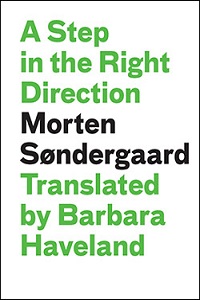This review also appears in Arc 72, The North. See our print issue for further reviews of great books, along with scintillating poetry, thought-provoking essays and more.
Morten Søndergaard. A Step in the Right Direction. Trans. Barbara Haveland. Toronto: Book Thug, 2012.
~Reviewed by Heather Spears.
Morten Søndergaard is among the most respected contemporary Danish poets. A Step in the Right Direction is the second book of his poetry to be translated into English.
He calls these poems his Gå-digte or “Go-Poems”—meditations on walking in all its aspects. “Vademicum” (an Italian guidebook, literally: “walk with me”), the first of the four cantos, plays with probably every single image and usage of the word gå (go)—many of which are the same in both languages. Some, to the detriment of the translation, are not. The conceit, attempted in English, sometimes breaks down: “We go on the rocks, we go to rack and ruin, to the dogs, off our hands”—or is abandoned: gå på grund (go to ground) becomes “run aground”; går over (goes over) becomes “will pass.”
There are many moments of beauty and poignancy, as Søndergaard considers the “upstanding” bifurcate human and the frailty and danger innate to this act of walking, seen as a continuous slanting or sloping, a falling forward—into life, into the unknown, into language, into poetry: “He is on / the sloping incline, in constant fall.” Two sections, “Dagblog” and “Natblog” (“Dayblog” and “Nightblog”—translated, for some reason, not as blog but as book) are like his wonderful “Vinci” poems, lyrics in his personal voice that I find intelligent, direct, and disarming. Here the daily experiences of living, family, and the Italian landscape and townscape are illuminated by what is authentically central to him—the life of writing and of language: “I believe in the conspiracies of the words behind the back of the syntax”; “The letters melt off / the language glacier…Words run in rivers”; “We are water that has taken to remembering”; “I walk / up into the mountains with an invisible dog and write a poem.”
He tells of a modern, ordinary, lusty, and happy Orpheus and Euridiche: we know the story’s outcome and even so the momentum builds. The poem grabs and doesn’t let go. The translation loses nothing—this is the gold-filled rift running though the mountain to its broken, stammered finish. And it is made central to his theme. Like Orpheus, the poet-singer must go down to the underworld and discover “what language does when it’s alone” and “all that / doesn’t make it out / into the light.” He returns, and as he walks he “can tell that there is someone behind me in the dark.” He turns around. “We each lose the beloved / but are / left with the poem.”
Artist and writer Heather Spears lives in Denmark. Her work has won numerous prizes, including the Pat Lowther Memorial Award three times, and the Governor General’s Award for Poetry.


